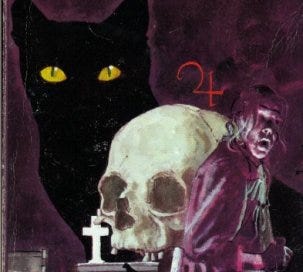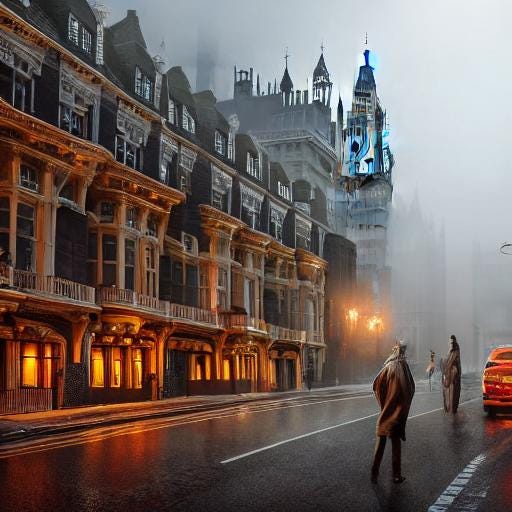"Halloween for Mr. Faulkner" (1959) by August Derleth
Peter Haining's anthology The Ghost's Companion (1976)
Readers unfamiliar with "Halloween for Mr. Faulkner" (1959) by August Derleth may prefer to read these notes only after reading the story.
Peter Haining's anthology The Ghost's Companion (1976) offers a generous selection of classics and – for its time – more recent works. Haining, a key horror tastemaker for me, fills the book with unalloyed classics like "A Haunted Island" (1899) and "Smoke Ghost" (1941), leavened with more newfangled tales like "South Sea Bubble" (1973) by thriller writer Hammond Innes.
My decision to read Halloween-centered short fiction led me to The Ghost's Companion because it contains "Halloween for Mr. Faulkner" (1959) by August Derleth.
"Halloween for Mr. Faulkner" is the first Derleth short story I have read. In the 1990s I collected several Derleth paperbacks, but they were his meretricious Lovecraft pastiches, and I never finished one..
"Halloween for Mr. Faulkner" is, on the other hand, extremely readable. The story is about an urban time-slip in the London fog.
There was simply no use going farther; so Guy Faulkner stood where he was, as helpless as if he were in the midst of a chartless sea….
The fog swirled around him, growing ever more dense—not yellow, as he had been led to believe, but a kind of grey shot through with a glow rising as from distant lights which had no separate identity.
Faulkner is a U.S. tourist visiting the UK to investigate his ancestry. The character of Halloween as eraser of boundaries allows him a closer look at his family history then Faulkner has bargained for. Apparently by chance he takes shelter at 16 Paradise Street.
Five men in dominoes have been awaiting his arrival.
….Faulkner could not recall where he had met them, yet their names were now certainly coming back to him. But the feeling of apprehension did not leave him. He waited. The bottles and glasses were pushed aside, and Catesby leaned over.
‘The day’s been chosen, you'll recollect, Guy.’
'The fifth,’ said Winter.
One of them chuckled. ‘Was it not a clever thing to have chosen a night of this week for our last meeting? When so many are in costume, and the most improbable of all excites no question?’
'But for your own, Guy,’ said Wright. ‘A strange costume, indeed. And unmasked! How bold!’
‘Ah, I am but a humble servant of Mr Percy,’ Faulkner said, and grinned. But simultaneously he thought: Percy—but of course, he was employed by Percy. Had he not come over the sea from Flanders not long since? And spoken there with Stanley of Deventer? What nagged in his mind was a perplexity indeed. A broader ocean, a strange land, great cities . .
‘The powder’s laid,’ continued Catesby.
‘Aye, and the fuse is placed,’ said Percy. ‘He had good time in which to do these things from my house next door to Parliament House. A good and willing servant, indeed. Once this business is done with, I commend him to you. He will go to heights.’
‘One way or tother,’ said Wright sourly. ‘High by his skill or by the scaffold if we’re caught.’
Mr. Faulkner, to his own surprise, slips easily into the character of co-conspirator Guy.
He was Guy Faulkner of New York, in London in pursuing his genealogical studies. The year was 1953. But when he opened his eyes a moment later, he could have taken solemn oath that it was some other year. The candles flickered, and appurtenances of the house loomed grotesque in their age in the candlelight. The five masked men who stood about him, leaning over the map on the table, were impeccably dressed in the costumes of the seventeenth century’s turn.
When the meeting ends, Faulkner muses:
An elaborate hoax. Who could have been responsible for it? Or, for that matter, for his own words, spoken so glibly? Or was it a plot, indeed? Was it by some accident that he had stumbled upon an attempt to repeat history, to blow up Parliament? Apprehension spread through him again.
Only when he gets back to his hotel does a sort of explanation present itself.
His genealogy researcher, Inigo Gunter, reports:
‘I’ve been asleep,’ [Gunter] said, ruefully, looking at his watch. ‘And missed a nightcap with Barry.’
‘Have one with me,’ said Faulkner, moving towards the decanter. ‘I’ve had an evening.’
'In this fog?’
‘It’s beginning to lift.” Faulkner came back with glasses and the decanter. ‘What have you found?’
‘Ah, something of interest, indeed,’ said Gunter, becoming alert at once. ‘Though I’ve no way of knowing how you'll take it.’ He tossed off a drink and complimented Faulkner….
‘I’ve got you back as far as York. The name was changed, you see, in 1605. Used to be Fawkes. Family of Edward Fawkes of York. It was Edward’s son Guy .. .’
Derleth's style is modest and economical, nicely humdrum compared to the grandiose farragoes of prose he attempts when trying to outdraw Lovecraft.
Jay





